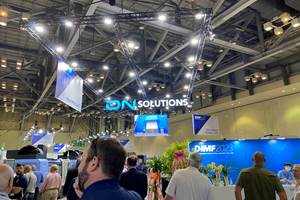Setting up Your Machine Shop for Succession Success
Here are ways the husband and wife owners of a machine shop in Fridley, Minnesota, are preparing for their son and daughter to take the reins.
Share




Scott and Cheryl Larson chalk up their shop’s success over the course of 20 years to establishing relationships with key people who have helped grow the company and make it more efficient. “You have to know when to ask for help,” Scott says.
The husband and wife team are co-owners of Colburn Manufacturing, a Fridley, Minnesota, shop that serves a range of industries and specializes in CNC Swiss-type turning. The Larsons have reached a point in which they are ready to retire and hand the business to their son Clint (application engineer) and daughter Liz (director of operations). In fact, they are a little more than one year into their five-year succession-planning process.
The process started with Cheryl taking a Small Business Administration class to get a general idea of what steps needed to be taken and how long the transition timetable should be. The Larsons knew they needed additional outside help to ensure a smooth transition of the business to their children, so they turned to Tom Huberty, CEO of the management-consulting firm Huberty Performance Learning. Part of Tom’s strategy in helping to set up the business for succession success and growth is applying Entrepreneurial Operating System (EOS) concepts. Developed by Gino Wickman, founder of leadership team development company EOS Worldwide, EOS focuses on strengthening six key business components: vision, people, data, issues, process and traction. Tom says EOS concepts accelerate positive change within a company in those areas.
The family meets with Tom monthly. Clint says he has helped keep communication open between the family members while ensuring they take time to work on the business, not just in the business. To do this, Tom assigns the family members various transition-process projects. Liz says some of these have included refining the hiring process to ensure that potential employees are a good fit with the shop’s culture, minimizing process waste by using 5S to organize the workplace, and documenting job costing. This last project was designed to capture Scott’s tribal knowledge he draws on when quoting new work by identifying all potential cost elements for any job.
Tom says it is important for shops to identify their niche at the onset of succession planning. “You need a firm grasp of who you are as a business, what customer segments you serve, what your customers’ expectations are and what the core values are upon which your company is founded,” he explains. “I also suggest taking an EOS assessment to get a baseline as to where your company stands relative to the six key EOS business components.”
Clint believes it is also important for Liz and him to maintain open communication with customers during the transition. The two are now part of all customer meetings, and Scott and Cheryl tend to defer to them to answer many of their customers’ questions. That way, customers clearly see the transition in progress so there is no chance of surprises. Customers also see Cheryl and Scott taking more time off (going so far as to take a “practice retirement” month away in January), so they are becoming more comfortable calling Clint or Liz when they have questions.
One bit of advice Cheryl suggests to other shop owners contemplating retiring is to start succession planning early. “I’ve heard of owners planning to make the transition in only one year,” she says. “I can’t imagine doing that.”
Related Content
Workholding Fixtures Save Over 4,500 Hours of Labor Annually
All World Machinery Supply designs each fixture to minimize the number of operations, resulting in reduced handling and idle spindle time.
Read MoreThe Power of Practical Demonstrations and Projects
Practical work has served Bridgerland Technical College both in preparing its current students for manufacturing jobs and in appealing to new generations of potential machinists.
Read MoreDN Solutions Responds to Labor Shortages, Reshoring, the Automotive Industry and More
At its first in-person DIMF since 2019, DN Solutions showcased a range of new technologies, from automation to machine tools to software. President WJ Kim explains how these products are responses to changes within the company and the manufacturing industry as a whole.
Read MoreInside Machineosaurus: Unique Job Shop with Dinosaur-Named CNC Machines, Four-Day Workweek & High-Precision Machining
Take a tour of Machineosaurus, a Massachusetts machine shop where every CNC machine is named after a dinosaur!
Read MoreRead Next
Setting Up the Building Blocks for a Digital Factory
Woodward Inc. spent over a year developing an API to connect machines to its digital factory. Caron Engineering’s MiConnect has cut most of this process while also granting the shop greater access to machine information.
Read More5 Rules of Thumb for Buying CNC Machine Tools
Use these tips to carefully plan your machine tool purchases and to avoid regretting your decision later.
Read MoreBuilding Out a Foundation for Student Machinists
Autodesk and Haas have teamed up to produce an introductory course for students that covers the basics of CAD, CAM and CNC while providing them with a portfolio part.
Read More






















.jpg;maxWidth=300;quality=90)








